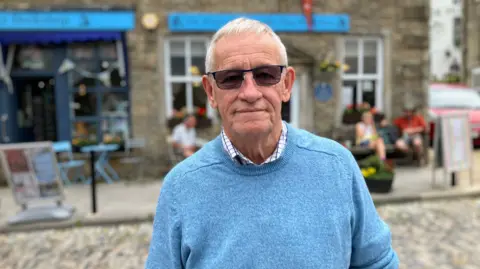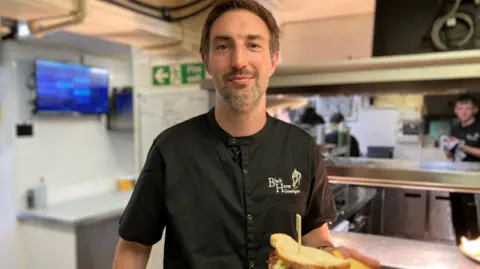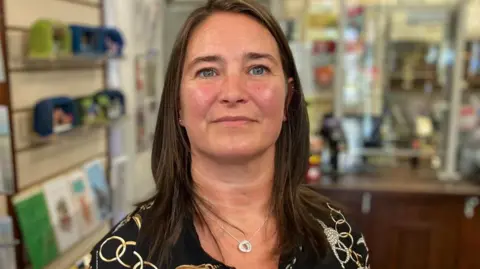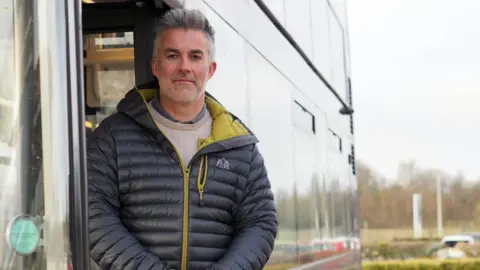'A bus shortage means we can't get people to work in our village'
 Mark Ansell/BBC
Mark Ansell/BBCBusinesses in a Yorkshire Dales village say the lack of public transport mean recruiting staff is a problem.
Services between Grassington and the town of Skipton run every two hours with the last bus departing the village at 18:30.
Steve Bielby, who runs Stripey Badger Coffee Shop and Kitchen, said: "We've had staff start from Skipton, lasted about two weeks and have decided it's not reliable and not enough. It's badly under-funded."
In this week's government Spending Review, the chancellor announced bus franchise pilots in York and North Yorkshire but the regional mayor said more help was needed.
 Mark Ansell/BBC
Mark Ansell/BBCBen McLoughlin, head chef at the Black Horse Hotel, said they had also experienced difficulties due to a shortage of buses.
"We have staff here who can only do certain days of the week, they don't want to do that, they want to do more," he said.
"If the public transport was there then more people, not just staff but the customers, could come to the village.
"It's a tourist community. We need those public transport links to provide money into the community."
The village has always seen a steady stream of tourists, but recent filming of the Channel 5 reboot of All Creatures Great and Small, which follows the lives of Dales vets in the 1940s, has increased interest.
 Mark Ansell/BBC
Mark Ansell/BBCClaire Regan, postmistress at Grassington Post Office, said elderly customers were losing their independence because of poor public transport.
In an attempt to tackle these issues, York and North Yorkshire was announced as one of the first places to trial a working rural bus franchising model.
The pilot aims to deliver a better bus service for communities that currently see only one bus per week and connect them with education, work and health services.
York and North Yorkshire Combined Authority said it would lead studies into how bus services operate across urban, rural, and coastal areas and set the agenda for other rural areas.
 York and North Yorkshire Combined Authority
York and North Yorkshire Combined AuthorityHowever, Labour Mayor David Skaith said it was disappointing not to get further investment into improving provisions.
"We can't be on this two-tier system where the core city regions are getting big uplifts and we're not," he said.
"Our region deserves that investment. We have great opportunities here, we want to keep young people here and we want to keep people moving around our region in a sustainable way.
"Having that uplift investment is absolutely vital to achieving that."
A government spokesperson said they were extending the £3 bus fare cap to 2027 and putting £900m into bus services across the country.
"Our incoming Bus Services Bill also includes a measure to protect thousands of miles of vital routes from being scrapped at short notice - with councils and operators required to meet strict conditions before changing or cancelling them, and ensuring rural passengers can trust their bus networks again," they added.
